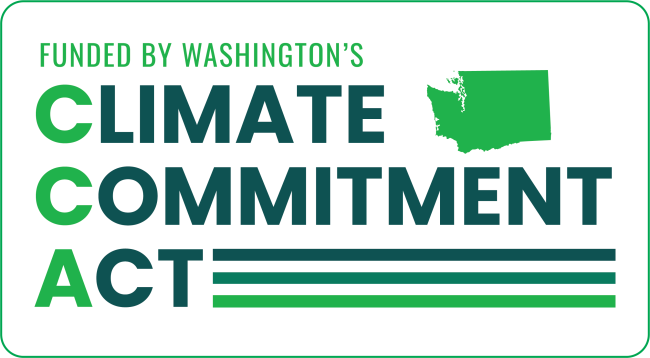E-bike rebate program
Learn about the WE-bike instant rebate program and upcoming ways to try e-bikes.
The e-bike rebate program has distributed all rebates and is not accepting applications at this time
Washington state is proud to deliver WE-bike, an instant rebate program that helps Washington residents purchase certain cycling equipment and electric bicycles, also called e-bikes. Share your email address with us to receive limited updates about this program.
In April 2025, people across the state applied online for one of these instant rebates. The application was open from 7 a.m. Wednesday, April 9, through noon Wednesday, April 23. More than $4 million was available for instant rebates of either $300 or $1,200 per person.
On this page you’ll learn about:
- Rebate program eligibility
- Using your instant rebate
- Other ways to try e-bikes or participate in research
A link to apply for a rebate was available on the dedicated application website.
WE-Bike began randomly selecting applicants to receive rebates after the application window closed. Those selected for rebates were notified through early May. Those notified had 96 hours (four days) to submit requested documentation via email to our contractor, APTIM.
Program funding
This grant program is entirely funded through Climate Commitment Act revenues. The CCA supports Washington’s climate action efforts by putting cap-and-invest dollars to work reducing climate pollution, creating jobs and improving public health.

Other ways to try e-bikes or participate in research
University of Washington E-bike research
Local researchers want your help understanding how people use e-bikes. When you apply for an instant rebate through the WE-Bike program, you will have the option of joining a research project affiliated with the University of Washington’s Sustainable Transportation Lab. These researchers have already published a general policy brief (PDF 704KB) that helped us develop our instant rebate program.
The research will evaluate the WE-Bike program by analyzing user survey results.
E-bike lending library pilot program
While many people are interested in e-bikes, not everyone will be able to receive a rebate through the WE-Bike program. People also may not be ready or able to purchase e-bikes for various reasons.
When the Washington State Legislature passed legislation funding for the WE-Bike program, it also funded the development of e-bike lending library and ownership grant programs. These programs are not yet available, but we will provide more information about them as this changes.
Organizations will be able to apply for grants to develop local e-bike libraries and loan-to-own programs. We may accept grant applications from other state entities, local governments and tribal governments that run, or plan to run, versions of these to make it easier for low-income residents, members of overburdened communities, or their staff to drive less.
If you want to learn more about establishing an e-bike lending library and meet the criteria of a Tribe, government entity or non-profit, please email adele.peers@wsdot.wa.gov.
Slow down on ice and snow.
It's easier to skid or lose control traveling at higher speeds. Give yourself more time to stop.
Carry chains, practice installing them.
Winter conditions could mean chains are required on your route. Practice putting them on your vehicle ahead of time.
Pack your winter car kit.
Carry extra supplies like warm clothing, ice scraper and brush, jumper cables and other emergency items.
